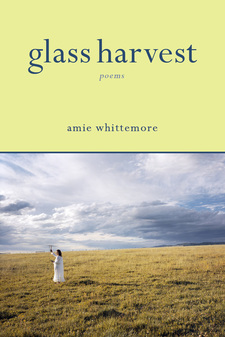In her debut poetry collection Glass Harvest (2016) Amie Whittemore unites all aspects of the universe: family, nature, farmland, music, and even the mythical and mysterious. It is full of surprises, moments of elation followed by moments of poignant grief, dark imagery juxtaposed with snapshots of beautiful, rural landscapes. With her poems, Whittemore celebrates the offbeat and unconventional, resulting in a collection of poems that mirror the chaos and unpredictability of family, both in form and content. Whittemore plays with form to deliver powerful messages about the chaos of family affairs. The first instance of this can be seen in the poem “Yard Catalog” which is structured as two columns with lists of one or two words, short phrases. Initially, it is difficult to understand how the poem is intended to be read. In fact, it is up to the reader to interpret the meaning of the poem. It can be read line by line, up and down, or as stand-alone words and phrases used to depict a larger meaning. A similar structure is seen again toward the end of the book in “Memory Place” which has three columns of words or phrases. These two poems, as well as the many liberties that Whittemore takes with the structure and linear passage of her poems, remind the reader of the secret language used by loved ones, or the familiar chaos of family functions. While the form that Whittemore uses has the reader feel a bit disoriented, it mirrors the often dysfunctional structure of family.
Although the poems stand alone, the subjects of her poems often revolve around family and the powerful, complicated relationships between those we love. In the first poem, “Dream of the Arch,” Whittemore discusses many aspects of family: brothers, husband, a late grandmother, and even the future children of her brothers and her own unborn daughter, communicating across past, present, and future. She contemplates a conversation with her daughters stating, “I warn her the future is a skinned animal/ Stalking us all.” Here she stretches the borders of family ties to include those not born, showing the strength and protection of maternal love. The main focus of her poems are often family members, written directly to them or referencing them in some way. The juxtaposition of often dark imagery and themes such as the future as a “skinned” predator that “stalks” along with the addressing of her future daughter shows the security of family, and that it reaches beyond the bounds of the earthly. This boundlessness of family is expanded in the poem “First Visitation” which is written for Whittemore’s great grandmother Kathryn. Whittemore describes a visitation by a ghost, stating, “Her voice/ rakes all the leave. Harvests me.” Here is another instance of the unbinding ties of family and maternal love. Whittemore moves boundlessly across time to portray the strength of family, her subjects not always living, but continuously guiding her mentality. As well as the ties that bind, Whittemore also depicts devastating tales about the brokenness of family, the power of seduction, and the regrets of lost love. This is portrayed through her narration of an attraction to a woman, her divorce, and reconciling a new way of being with what was left behind. This is illustrated poignantly in the poem “Poem for the Former Niece” which is filled with both remorse and longing for memories with her former niece following a divorce. She states, “In this new land, I treat you/ like a unicorn. Sugar cubes/ in my hand, soft whistle/ in my throat.” These lines show the guilt of hurting your loved ones and the hope for redemption and forgiveness. “In this new land” symbolizes the exploration of sexuality, the debris after the catastrophe of divorce, and the chaos proceeding change. This reconciliation radiates throughout many pieces – illustrating the investigation of relationships; both within the family and within the individual. Although at times you might feel off-balance while reading Glass Harvest, the reader is constantly amazed by the unique uses of metaphor, the brilliant language, and the accurate sentiment of the chaos of family. Whittemore pushes boundaries of time uniting the past, present, and future. She pushes boundaries of identity, examining sexuality and growth. She pushes boundaries of family, encapsulating the dance of chaos and harmony in domestic relationships. And while Whittemore is pushing these boundaries, she invites her readers to do the same.
0 Comments
Leave a Reply. |
Archives
April 2024
Categories
All
|
|
Glassworks is a publication of Rowan University's Master of Arts in Writing 260 Victoria Street • Glassboro, New Jersey 08028 glassworksmagazine@rowan.edu |
All Content on this Site (c) 2024 Glassworks
|


 RSS Feed
RSS Feed
